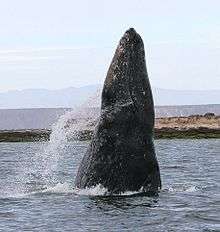balea
Basque
Declension
(animate noun) declension of balea
|
Galician

Balea
Etymology 1
13th century. From Latin ballaena, from Ancient Greek φάλλαινα (phállaina). Compare Portuguese baleia, Spanish ballena, or Basque balea.
Pronunciation
- IPA(key): /baˈlea̝/
Noun
balea f (plural baleas)
- baleen whale
- whale
- 1291, E. Cal Pardo (ed.), Colección diplomática medieval do arquivo da catedral de Mondoñedo. Santiago: Consello da Cultura Galega, page 79:
- et disso que despenderan en tres ueces que fora a San Cibrao a pinnorar a balea et a entregala ccc mor. et disso que ennas pinnaças et no trager da balea metera c mor. et quandor foronon o maestreescola et don Pedro Dias a San Cibrao con quinentos ommes et con xxx a caualo por tomar esta balea aos ommes do infante
- and he said that he spent, in three times that he went to San Cibrao to pawn the whale and to deliver it, 300 mor.; and he said that in the pinnaces and in the delivery of the whale he spent 100 mor.; and when the schoolmaster and lord Pedro Dias went to San Cibrao with five hundred peons and 30 mounted men, for seizing the whale from the prince's men
- et disso que despenderan en tres ueces que fora a San Cibrao a pinnorar a balea et a entregala ccc mor. et disso que ennas pinnaças et no trager da balea metera c mor. et quandor foronon o maestreescola et don Pedro Dias a San Cibrao con quinentos ommes et con xxx a caualo por tomar esta balea aos ommes do infante
- 1291, E. Cal Pardo (ed.), Colección diplomática medieval do arquivo da catedral de Mondoñedo. Santiago: Consello da Cultura Galega, page 79:
- whalebone
Pronunciation
- IPA(key): /baˈlea̝/
Derived terms
- baleadoira
References
- “balea” in Xavier Varela Barreiro & Xavier Gómez Guinovart: Corpus Xelmírez - Corpus lingüístico da Galicia medieval. SLI / Grupo TALG / ILG, 2006-2016.
- “balea” in Dicionario de Dicionarios da lingua galega, SLI - ILGA 2006-2013.
- “balea” in Tesouro informatizado da lingua galega. Santiago: ILG.
- Matasović, Ranko (2009) Etymological Dictionary of Proto-Celtic (Leiden Indo-European Etymological Dictionary Series; 9), Leiden: Brill, →ISBN, page 53-54
Spanish
This article is issued from
Wiktionary.
The text is licensed under Creative
Commons - Attribution - Sharealike.
Additional terms may apply for the media files.